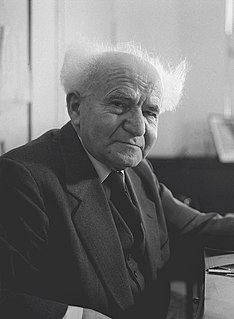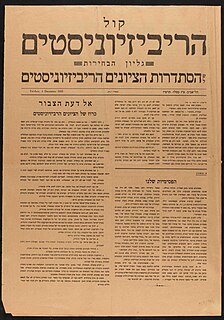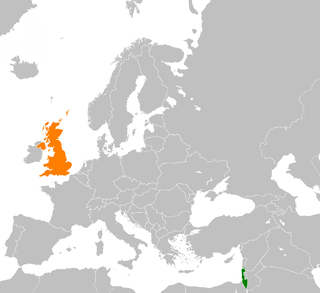Thomas Rosling Howlett (1827-1898) was a Baptist pastor and early proponent of British Israelism. He authored Anglo-Israel, the Jewish problem (1892) considered one of the most influential works on the British-Israel teaching. [1] [2]
Thomas Rosling Howlett (1827-1898) was a Baptist pastor and early proponent of British Israelism. He authored Anglo-Israel, the Jewish problem (1892) considered one of the most influential works on the British-Israel teaching. [1] [2]
The Land of Israel, also known as the Holy Land or Palestine, is the birthplace of the Jewish people, the place where the final form of the Hebrew Bible is thought to have been compiled, and the birthplace of Judaism and Christianity. It contains sites sacred to Judaism, Samaritanism, Christianity, Islam, Druze and the Baháʼí Faith. The region has come under the sway of various empires and, as a result, has hosted a wide variety of ethnicities. However, the land was predominantly Jewish from roughly 1,000 years before the Common Era (BCE) until the 3rd century of the Common Era (CE). The adoption of Christianity by the Roman Empire in the 4th century led to a Greco-Roman Christian majority which lasted not just until the 7th century when the area was conquered by the Arab Muslim Empires, but for another full six centuries. It gradually became predominantly Muslim after the end of the Crusader period (1099-1291), during which it was the focal point of conflict between Christianity and Islam. From the 13th century it was mainly Muslim with Arabic as the dominant language and was first part of the Syrian province of the Mamluk Sultanate and after 1516 part of the Ottoman Empire until the British conquest in 1917-18.

Menachem Begin was an Israeli politician, founder of Likud and the sixth Prime Minister of Israel. Before the creation of the state of Israel, he was the leader of the Zionist militant group Irgun, the Revisionist breakaway from the larger Jewish paramilitary organization Haganah. He proclaimed a revolt, on 1 February 1944, against the British mandatory government, which was opposed by the Jewish Agency. As head of the Irgun, he targeted the British in Palestine. Later, the Irgun fought the Arabs during the 1947–48 Civil War in Mandatory Palestine and its chief Begin was also noted as "leader of the notorious terrorist organisation" by British government and banned from entering the United Kingdom.

Lehi, often known pejoratively as the Stern Gang, was a Zionist paramilitary organization founded by Avraham ("Yair") Stern in Mandatory Palestine that used terrorist means in its actions. Its avowed aim was to evict the British authorities from Palestine by resort to force, allowing unrestricted immigration of Jews and the formation of a Jewish state, a "new totalitarian Hebrew republic". It was initially called the National Military Organization in Israel, upon being founded in August 1940, but was renamed Lehi one month later. The group referred to its members as terrorists and admitted to having carried out terrorist attacks.

Zionism is both an ideology and nationalist movement among the Jewish people that espouses the re-establishment of and support for a Jewish state in the territory defined as the historic Land of Israel. Modern Zionism emerged in the late 19th century in Central and Eastern Europe as a national revival movement, both in reaction to newer waves of antisemitism and as a response to Haskalah, or Jewish Enlightenment. Soon after this, most leaders of the movement associated the main goal with creating the desired state in Palestine, then an area controlled by the Ottoman Empire.

The 1948Arab–Israeli War was the second and final stage of the 1947–49 Palestine war. It formally began following the end of the British Mandate for Palestine at midnight on 14 May 1948; the Israeli Declaration of Independence had been issued earlier that day, and a military coalition of Arab states entered the territory of British Palestine in the morning of 15 May.

The Israel Defense Forces, commonly known in Israel by the Hebrew acronym Tzahal, are the military forces of the State of Israel. They consist of the ground forces, air force, and navy. It is the sole military wing of the Israeli security forces, and has no civilian jurisdiction within Israel. The IDF is headed by its Chief of General Staff, the Ramatkal, subordinate to the Defense Minister of Israel; Lieutenant General Aviv Kochavi has served as Chief of Staff since January 15, 2019.
Haganah was the main paramilitary organization of the Jewish population ("Yishuv") in Mandatory Palestine between 1920 and 1948, when it became the core of the Israel Defense Forces (IDF).

The Suez Crisis, or the Second Arab–Israeli war, also called the tripartite aggression in the Arab world and Sinai War in Israel, was an invasion of Egypt in late 1956 by Israel, followed by the United Kingdom and France. The aims were to regain Western control of the Suez Canal and to remove Egyptian president Gamal Abdel Nasser, who had just nationalised the canal. After the fighting had started, political pressure from the United States, the Soviet Union and the United Nations led to a withdrawal by the three invaders. The episode humiliated the United Kingdom and France and strengthened Nasser.

David Ben-Gurion was the primary national founder of the State of Israel and the first Prime Minister of Israel. He was the preeminent leader of the Jewish community in British Mandate Palestine from 1935 until the establishment of the State of Israel in 1948, which he led until 1963 with a short break in 1954–55.

British Israelism is a pseudoarchaeological belief that the people of the British Isles are "genetically, racially, and linguistically the direct descendants" of the Ten Lost Tribes of ancient Israel. With roots in the 16th century, British Israelism was inspired by several 19th century English writings such as John Wilson's 1840 Our Israelitish Origin. Numerous British Israelite organisations were set up throughout the British Empire as well as in America from the 1870s onwards; a number of these organisations are independently active as of the early 21st century. In America, the idea gave rise to the Christian Identity movement.

Aliyah is the immigration of Jews from the diaspora to the Land of Israel historically, which today includes the modern State of Israel. Also defined as "the act of going up"—that is, towards Jerusalem—"making aliyah" by moving to the Land of Israel is one of the most basic tenets of Zionism. The opposite action, emigration from the "Land of Israel", is referred to in Hebrew as yerida ("descent"). The State of Israel's Law of Return gives Jews, their children, and their grandchildren automatic rights regarding residency and Israeli citizenship.

The Bene Israel are a community of Jews in India. It has been suggested that it is made up of descendants of one of the disputed Lost Tribes and ancestors who had settled there centuries ago. In the 19th century, after the people were taught about normative (Ashkenazi/Sephardi) Judaism, they tended to migrate from villages in the Konkan area to the nearby cities, primarily Mumbai, but also to Pune, Ahmedabad, India; and Karachi, in today's Pakistan. Many gained positions with the British colonial authority of the period.

Revisionist Zionism was an ideology developed by Ze'ev Jabotinsky, who advocated a "revision" of the "practical Zionism" of David Ben-Gurion and Chaim Weizmann which was focused on independent individuals' settling of Eretz Yisrael. Revisionism differed from other types of Zionism primarily in its territorial maximalism. Revisionists had a vision of occupying the full territory, and insisted upon the Jewish right to sovereignty over the whole of Eretz Yisrael, which they equated to the whole territory covered by the League of Nations Mandate for Palestine, including Transjordan. It was the chief ideological competitor to the dominant socialist Labor Zionism.

The Israel national football team represents Israel in international football, and is governed by the Israel Football Association (IFA).

The Arab–Israeli conflict includes the political tension, military conflicts and disputes between Arab countries and Israel, which escalated during the 20th century, but had mostly faded out in the early 21st century. The roots of the Arab–Israeli conflict have been attributed to the support by Arab League member countries for the Palestinians, a fellow League member, in the ongoing Israeli–Palestinian conflict, which in turn has been attributed to the simultaneous rise of Zionism and Arab nationalism towards the end of the 19th century, though the two national movements had not clashed until the 1920s.

Israel, officially known as the State of Israel, is a country in Western Asia, located on the southeastern shore of the Mediterranean Sea and the northern shore of the Red Sea. It has land borders with Lebanon to the north, Syria to the northeast, Jordan on the east, the Palestinian territories of the West Bank and the Gaza Strip to the east and west, respectively, and Egypt to the southwest. Israel's economic and technological center is Tel Aviv, while its seat of government and proclaimed capital is Jerusalem, although international recognition of the state's sovereignty over Jerusalem is limited.

Israel–United Kingdom relations, or Anglo-Israeli relations, are the diplomatic and commercial ties between the United Kingdom and Israel. The British embassy to Israel is located in Tel Aviv. The UK has an honorary consul in Eilat and a non-accredited consulate-general in Jerusalem, that represents the United Kingdom in that city and the Palestinian territories. Israel has three representative offices in the United Kingdom: an Embassy located in London and consulates in Cardiff and Glasgow.
Anti-British sentiment is prejudice, fear or hatred against the British Government, British people, or the culture of the United Kingdom.

Mandatory Palestine was a geopolitical entity established between 1920–1948 in the region of Palestine under the terms of the League of Nations Mandate for Palestine.

The 1947–1949 Palestine war, known in Israel as the War of Independence and in Arabic as the Nakba, was fought in the territory of Palestine under the British Mandate. It is the first war of the Israeli–Palestinian conflict and the broader Arab–Israeli conflict. During this war, the British Empire withdrew from Mandate Palestine, which had been a province (eyalet) of the Ottoman Empire before British occupation in 1917. The war culminated in the establishment of the State of Israel by the Jews, and saw the complete demographic transformation of Palestine, with the displacement of around 700,000 Palestinian Arabs and the complete destruction of most of their villages, towns and cities. The Palestinian Arabs ended up stateless, displaced either to the Palestinian territories captured by Egypt and Jordan or to the surrounding Arab states; many of them, as well as their descendants, remain stateless and in refugee camps.
| This biography article of an English religious figure is a stub. You can help Wikipedia by expanding it. |